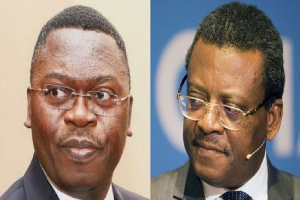Medium Sized Enterprises, MSE, doing business in Cameroon will soon be engaged in tele-declaration and payment of taxes.
The revelation was made by the Head of Division for Studies and Fiscal Affairs in the General Directorate of Taxation, GDT, Nicolas Hiol, during an open-door day organised by the Ministry of Finance.
The event, which was taking place within the framework of PROMOTE 2014, saw the active participation of heads of enterprises in the country. The day was held under the theme: “New Instruments at the Service of Competitiveness of the Economy.”
Presenting the perspectives of the GDT, Hiol said reforms engaged in 2007 by the institution in the wake of Cameroon’s attainment of the Completion Point of the Heavily Indebted Poor Countries Initiative, HIPC-I, is on course and yielding fruits. He said after successfully identifying businesses that pay taxes and getting them do so through the process of tele-declaration, the initiative will soon be extended to Medium Sized Enterprises.
He added that the tidying up, identification and grouping of tax payers in the appropriate regimes will be accelerated; stepping up internal capacity building of tax administrators and creating new tax centres, are some of the top activities of the GDT. He remarked that when the skills of the personnel are sharpened, it would reduce the cost of tax administration.
Hiol said for the public to see the necessity of tax reforms, their fundamental mission must be clearly made known.
“The GDT is an administration at the service of the tax payers. The personnel have an obligation of facilitating the declaration and payment of taxes of the client. They must work in a way that all tax payers would carry out their operations hitch-free. The GDT must ensure that all money paid as taxes get into the State coffers from where sums are drawn for the provision of facilities and services to the tax payers themselves, as well as other citizens.”
The tax administrator mentioned the recent signing of contracts with MTN Cameroon and Orange Cameroun for landed property owners in Yaounde and Douala to use the mobile money services in paying their taxes from January 2015. Hiol added that the GDT is working hard to improve on the use of the new information and communication technology in the payment of taxes.
Other areas of ongoing reforms in tax administration as presented by Hiol include the tidying up of identification of tax payers and the updating of their roll. He held that good and prompt tax payers must be very visible in their data base. He disclosed that for purposes of transparency and confidence-building in the tax payers, all the operations are published on their website: www.impots.cm.
On the provision of quality services, the Head of Division for Studies and Fiscal Reforms; said Service Units for tax payers have been created in all tax centres.
“They have the responsibility of assisting tax payers during declarations and payments of their taxes as well as in the issuing of all tax documents. Observing that disputes between tax payers and tax administration take unnecessarily very long time to resolve, Hiol said urgent measures are being taken in that direction.
The Head of Division for Disputes at the GDT, Dieudonne Ntonga, talked on incentives for private investment in Cameroon. He mentioned a series of texts spelling out conditions to be fulfilled in order to benefit from the incentives.
“Access to certain tax incentive schemes is conditioned upon obtainment of a licence. This is currently the case for tax scheme on private investment and the special tax scheme for structural adjustment projects,” Ntonga stated.
He said for scheme on investment, persons wishing to be accredited must be involved in activities within the industrial, tourism, craft, agriculture, livestock and fisheries sectors. Other criteria include job creation, export of part of production, using local natural resources, generating a value added increase and be regular with its tax filing and payment of obligations for existing businesses.
For tax scheme on structural adjustment projects, the request must include a stamped written application, a certificate of incorporation or its equivalence; a certificate of non-tax liability and a feasibility study. A technical and financial study must also be provided.
The conference was moderated by the Executive Secretary of GICAM, Alain Blaise Batongue.
Infos Business of Sunday, 21 December 2014
Source: The Post Newspaper












